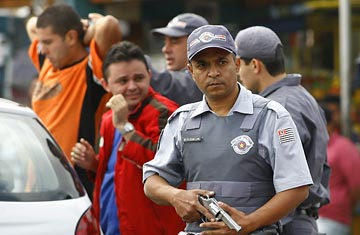
A police officer takes his position as others frisk suspects in São Paulo, Brazil, May 2006.
When hundreds of bodies suddenly began turning up in São Paulo in May 2006, many people suspected a secret war had taken place. There had been a very public initial skirmish when members of a gang known as the PCC had spent two days and nights terrorizing South America's biggest city, killing at least 33 law-enforcement officers and transforming São Paulo into a ghost town where 20 million people cowered behind their locked doors and barred windows. But more fresh corpses began turning up in the six days after the police had restored order than during the gang-induced chaos itself.
In a country where death squads operate with impunity and where only one in 10 homicides reach court, human-rights groups worried that the killings were a throwback to the bad old days when police took matters into their own hands. "We had two fears," says Eloisa Machado, a lawyer with the Conectas human-rights organization. "That public-security officers had abused their power and summarily executed people, and that these cases would be hushed up." She then claims, "Unfortunately, both these fears have been confirmed." (See pictures of São Paulo's attempts to clean itself up.)
A new report highlighting the abuses carried out during those eight bloody days in May has galvanized relatives and human-rights workers who refuse to let the matter fade away. The report, drawn up by experienced researchers in Rio de Janeiro and backed by the São Paulo police's own ombudsman, alleges that law-enforcement officers, many operating as hooded assassins, went after civilians and settled scores. Thirty-three officers were killed during the first two nights of attacks on police stations and other targets, according to data compiled by researchers at the State University of Rio de Janeiro. More than 400 civilians were killed in the days after. (Read a story on Brazil's President Lula.)
Researchers who examined the death certificates and medical records found that 90% of the bullets fired in the killings landed above the waist. 197 were fired into the back, 395 hit the chest area and 229 hit the head. Most shockingly, 152 bullets were fired into the base of the skull, indicative of summary execution. "The intention was not to stop people fleeing, the intention was to kill," says Henrique Carlos Goncalves, the president of the São Paulo Regional Council of Medicine, the body that examined the death certificates. "It was a massacre." (See pictures of a papal visit to Brazil.)
The families of those killed are frustrated at what they believe is the police's refusal to more seriously investigate their claims and say that if the federal government does not intervene they will go to the Inter American Court of Human Rights and put Brazil on trial. More than half of the cases have been officially closed by the authorities, in some instances even after relatives pointed out discrepancies in the officers' reports.
The mother of Rogerio da Silva, Debora da Silva, refuses to give up the fight. Da Silva says nine men killed her son after stopping him at a gas station. She recounts that they asked him if he had any previous convictions and when he responded that he had once spent two years in jail for armed robbery, they allegedly told him his time was up. The 29-year old was ambushed as he drove away and shot four times, da Silva says, citing eyewitnesses at the scene. She says it was eyewitnesses who told her that some of her son's assailants were cops.
But she says her sources and other witnesses are too scared to testify. In addition, the gas station stymied her attempts to secure its CCTV footage for seven weeks and when they finally handed it over, the tape had been erased. She claims the police changed the story on their official reports. When she called for the officers to be tried for homicide, officials said they could not try all nine without knowing who pulled the trigger and closed the case.
"The state needs to give us answers," da Silva says. "We want an ethical public-security policy." Police chiefs have so far refused to comment on the report, but the authorities have defended officers and pointed out that it was not the police that closed the cases but judges. The mothers and families of the dead vow to keep on fighting.
